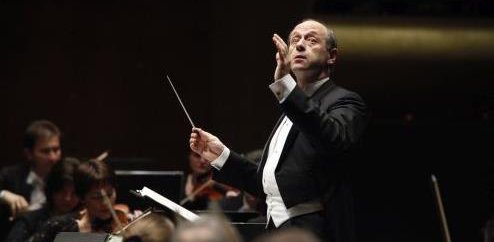Slavonic Dance, Op.72/8
Cello Concerto in B Minor, Op.104
Legend, Op.59/10
Symphony No.9 in E Minor “From the New World,” Op.95
It came early on, in a flowing account of the last Slavonic Dance, a gracious piece that unfolds like a waltz. Awaiting Daniel Müller-Schott’s arrival, a piano stool and platform had been left out, presumably to obviate the need for a seating change. But no. Halfway through, Gáspár Szente of the percussion section wandered through the strings, as if looking for something. A stocky, bald man, Szente daintily sat on the stool, coyly pulled a bell from his suit pocket, and stroked it gently, coaxed through by Fischer as if a true soloist. A generous ovation, a kiss for the leader, and off he loped.
In New York this past weekend we have had the musical world in miniature. Dotted around the city has been the “NY Phil Biennial,” disappointingly attended in two of the threeconcerts I’ve been to, but taking chances, pushing boundaries, and with the courage to fail. Here, at Avery Fisher, two all-Dvořák programmes from the BFO, packed to the rafters of course, mere months before the Philharmonic mounts its own totally unnecessary Dohnányi/Dvořák “festival” featuring almost exactly the same works. Critics aside, one wonders how many people have taken samples of both.
Not that Fischer and the BFO didn’t push the envelope in their own way. This is no ordinary orchestra, its dark, frantic style an extension of Fischer’s mind, capable of mischief and utter transcendence just moments apart. Most importantly, this is a genuine unit, one that listens and blends like few other groups. Fischer’s arrangements tend to have the double basses arrayed across the back of the hall, rooting the sound more consciously and clearly than typically, but the sound visibly emanates from the bow (the body, really) of cellist Péter Szabó, an energetic presence whose eyes rarely leave the conductor.
The orchestra nearly stole the show in the first movement of the concerto. I didn’t want the horn principal’s nostalgic treatment of the second theme to end, and there were melting seconds later on when the clarinet and then the flute serenade the cello, stopping time in its tracks. Daniel Müller-Schott has a slightly buzzy sound, as if the cello is engaged in a constant effort to reaching sharp, but this was serious and committed playing, as full of contrasts as Fischer’s vision from the podium. If slight issues of coordination niggled here, the second movement was much better. Fischer’s incongruities made the most off a lumbering march, providing space when it collapsed for Müller-Schott to create a gentle stillness, emerging from the rubble to transfix and guide. The finale, too, was full of vivid storytelling, by turns tender and giddy. Müller-Schott, a fine cellist with a greater reputation in Europe than the United States, was never less than eloquent.
A Legend prefaced the symphony, but seemed wasteful to me. Why sap the energy from the opening bars of the main event, except to undermine its eventfulness itself? That sense of something special lifted the most recent Ninth I heard – Manfred Honeck’s with the New York Philharmonic – to an extraordinary intensity, but even with playing beyond reproach Fischer’s idiosyncrasies kept this more earthbound, at least until the last movement. The first was jagged, always with something going on, some uncommon details poking through, more often than not tellingly. If it lacked the final edge you’d hope for, at least you could be satisfied the sound: foreboding, with a pocket of air around it that is practically impossible in this hall. And there was plenty to enjoy in the precision and variation of wind tone and phrasing. That impressed, too, in the clichéd second movement. Lovely though the cor anglais solo was, the subtlety and nobility of Ákos Ács’s clarinet doubling lingered more, as did his blend with the flutes towards the end. The scherzo was rambunctious, with much made of the fake ending, a transition you think is going to be a carbon copy of Beethoven’s Fifth, but turns out not to be. Only the finale engrossed, at high speeds and with a rare unity of attack. Impetuous but structurally clear, it gripped all the way to its tumultuous close.


